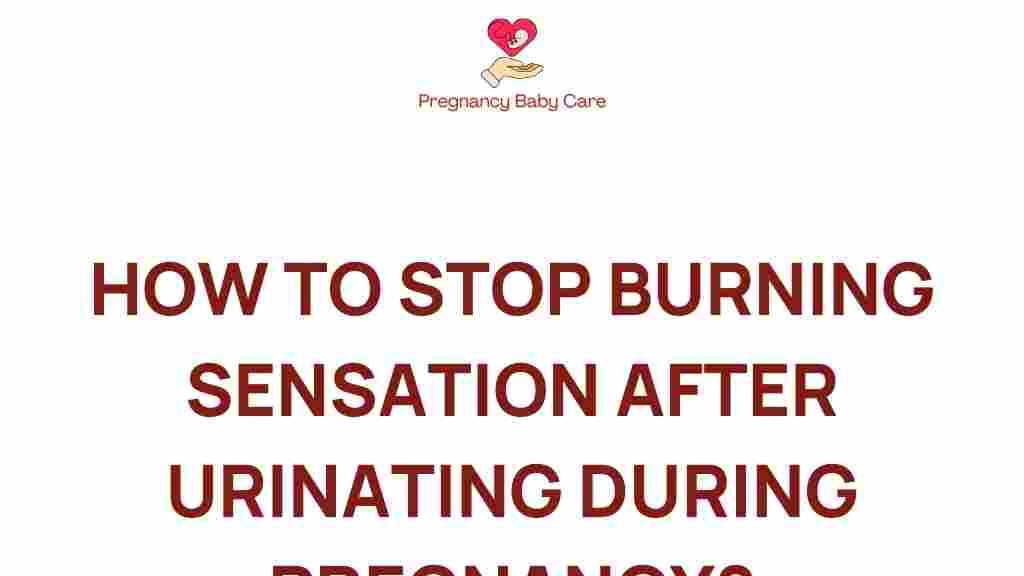Unraveling the Mystery of Burning Sensation During Pregnancy
Pregnancy is a beautiful journey filled with anticipation and excitement, but it can also bring about various discomforts. One common complaint among expectant mothers is the **burning sensation** that can occur during this time. While it may be alarming, understanding the causes and solutions can help ease anxiety and improve overall well-being. In this article, we will explore the burning sensation and its connection to pregnancy discomfort, urinary symptoms, and bladder health, providing health tips and insights into prenatal care.
Understanding the Burning Sensation in Pregnancy
During pregnancy, many women experience new sensations and changes in their bodies. A **burning sensation** can manifest in different areas, but it is most frequently reported in the urinary tract. This discomfort can range from mild to severe and may be accompanied by other symptoms. It’s essential for expectant mothers to recognize these signs and understand their implications.
Common Causes of Burning Sensation
There are several reasons why expectant mothers may experience a **burning sensation** during pregnancy:
- Urinary Tract Infections (UTIs): UTIs are common during pregnancy due to hormonal changes and increased pressure on the bladder. Symptoms include a burning sensation while urinating, frequent urination, and cloudy urine.
- Increased Hormonal Activity: The body undergoes significant hormonal changes during pregnancy, which can affect the urinary system and lead to discomfort.
- Pressure on the Bladder: As the uterus expands, it puts pressure on the bladder, which can cause a burning sensation and other urinary symptoms.
- Dehydration: Not drinking enough fluids can lead to concentrated urine, which may irritate the bladder and cause burning.
- Skin Sensitivity: Hormonal changes can also increase skin sensitivity, leading to a burning sensation in the abdominal area.
Recognizing Other Symptoms
In addition to the **burning sensation**, there are other urinary symptoms that expectant mothers should be aware of:
- Painful urination
- Frequent urge to urinate
- Cloudy or foul-smelling urine
- Lower abdominal pain
- Fever or chills (indicating a possible infection)
When to Seek Medical Attention
While some burning sensations may be normal, it’s vital to know when to consult a healthcare professional. Expectant mothers should seek medical advice if they experience:
- Severe or persistent burning sensation
- Symptoms of a UTI
- Signs of dehydration
- Any unusual or severe abdominal pain
- Fever or chills
Health Tips for Managing Burning Sensation
Here are some practical health tips to help manage the **burning sensation** and other pregnancy discomforts:
- Stay Hydrated: Drinking plenty of water can help dilute urine and reduce irritation. Aim for at least 8-10 glasses of water daily.
- Practice Good Hygiene: Wiping from front to back and urinating after intercourse can help prevent UTIs.
- Wear Comfortable Clothing: Opt for loose-fitting clothes and breathable fabrics to minimize irritation.
- Monitor Diet: Avoid spicy foods, caffeine, and acidic foods that may irritate the bladder.
- Consult Your Doctor: If discomfort persists, speak to your healthcare provider for advice and possible treatment options.
Step-by-Step Guide to Alleviating Discomfort
To alleviate the **burning sensation** and other discomforts associated with pregnancy, follow this step-by-step guide:
- Identify Symptoms: Keep a record of when the burning sensation occurs and any accompanying symptoms.
- Increase Fluid Intake: Drink plenty of water throughout the day to stay hydrated.
- Maintain Hygiene: Ensure proper hygiene practices to reduce the risk of UTIs.
- Adjust Diet: Eliminate foods and beverages that may irritate the bladder.
- Seek Professional Help: If symptoms do not improve within a few days, consult a healthcare provider.
Importance of Prenatal Care
Prenatal care plays a crucial role in maintaining the health of expectant mothers and their babies. Regular check-ups allow healthcare providers to monitor both physical and emotional well-being. Here are some benefits of prenatal care:
- Early detection and treatment of potential issues, such as UTIs.
- Guidance on maintaining a healthy lifestyle during pregnancy.
- Support for managing pregnancy discomforts effectively.
- Opportunities to ask questions and discuss concerns regarding symptoms like **burning sensation**.
For more information on prenatal care, you can visit this resource on maternal health.
Common Concerns Among Expectant Mothers
Expectant mothers often share similar concerns related to **burning sensation** and other symptoms. Here are a few common worries:
- Is the burning sensation normal? While some burning sensations can be typical, it’s essential to consult a healthcare provider if symptoms are severe or persistent.
- How can I prevent UTIs during pregnancy? Staying hydrated, practicing good hygiene, and avoiding irritants can significantly reduce the risk of UTIs.
- What should I do if I suspect a UTI? It’s crucial to seek medical attention promptly for diagnosis and treatment.
- Can a burning sensation affect my baby? While it may not directly affect the baby, underlying issues like UTIs should be treated to ensure the health of both mother and child.
Conclusion
Experiencing a **burning sensation** during pregnancy can be concerning for expectant mothers, but understanding its causes and implementing effective strategies can help manage discomfort. By prioritizing bladder health, maintaining proper hydration, and seeking prenatal care, women can navigate this journey more comfortably. If you have any concerns regarding symptoms, don’t hesitate to reach out to your healthcare provider for guidance and support.
Remember, pregnancy is a unique experience for every woman, and addressing common concerns can lead to a healthier, happier journey to motherhood.
This article is in the category Health and created by PregnancyBabyCare Team
